Julian Savulescu
A Quantifiable Information-Processing Hierarchy Provides a Necessary Condition for Detecting Agency
Jan 07, 2026Abstract:As intelligent systems are developed across diverse substrates - from machine learning models and neuromorphic hardware to in vitro neural cultures - understanding what gives a system agency has become increasingly important. Existing definitions, however, tend to rely on top-down descriptions that are difficult to quantify. We propose a bottom-up framework grounded in a system's information-processing order: the extent to which its transformation of input evolves over time. We identify three orders of information processing. Class I systems are reactive and memoryless, mapping inputs directly to outputs. Class II systems incorporate internal states that provide memory but follow fixed transformation rules. Class III systems are adaptive; their transformation rules themselves change as a function of prior activity. While not sufficient on their own, these dynamics represent necessary informational conditions for genuine agency. This hierarchy offers a measurable, substrate-independent way to identify the informational precursors of agency. We illustrate the framework with neurophysiological and computational examples, including thermostats and receptor-like memristors, and discuss its implications for the ethical and functional evaluation of systems that may exhibit agency.
Relational Norms for Human-AI Cooperation
Feb 17, 2025Abstract:How we should design and interact with social artificial intelligence depends on the socio-relational role the AI is meant to emulate or occupy. In human society, relationships such as teacher-student, parent-child, neighbors, siblings, or employer-employee are governed by specific norms that prescribe or proscribe cooperative functions including hierarchy, care, transaction, and mating. These norms shape our judgments of what is appropriate for each partner. For example, workplace norms may allow a boss to give orders to an employee, but not vice versa, reflecting hierarchical and transactional expectations. As AI agents and chatbots powered by large language models are increasingly designed to serve roles analogous to human positions - such as assistant, mental health provider, tutor, or romantic partner - it is imperative to examine whether and how human relational norms should extend to human-AI interactions. Our analysis explores how differences between AI systems and humans, such as the absence of conscious experience and immunity to fatigue, may affect an AI's capacity to fulfill relationship-specific functions and adhere to corresponding norms. This analysis, which is a collaborative effort by philosophers, psychologists, relationship scientists, ethicists, legal experts, and AI researchers, carries important implications for AI systems design, user behavior, and regulation. While we accept that AI systems can offer significant benefits such as increased availability and consistency in certain socio-relational roles, they also risk fostering unhealthy dependencies or unrealistic expectations that could spill over into human-human relationships. We propose that understanding and thoughtfully shaping (or implementing) suitable human-AI relational norms will be crucial for ensuring that human-AI interactions are ethical, trustworthy, and favorable to human well-being.
Development of Application-Specific Large Language Models to Facilitate Research Ethics Review
Jan 18, 2025Abstract:Institutional review boards (IRBs) play a crucial role in ensuring the ethical conduct of human subjects research, but face challenges including inconsistency, delays, and inefficiencies. We propose the development and implementation of application-specific large language models (LLMs) to facilitate IRB review processes. These IRB-specific LLMs would be fine-tuned on IRB-specific literature and institutional datasets, and equipped with retrieval capabilities to access up-to-date, context-relevant information. We outline potential applications, including pre-review screening, preliminary analysis, consistency checking, and decision support. While addressing concerns about accuracy, context sensitivity, and human oversight, we acknowledge remaining challenges such as over-reliance on AI and the need for transparency. By enhancing the efficiency and quality of ethical review while maintaining human judgment in critical decisions, IRB-specific LLMs offer a promising tool to improve research oversight. We call for pilot studies to evaluate the feasibility and impact of this approach.
Generative Artificial Intelligence in Healthcare: Ethical Considerations and Assessment Checklist
Nov 02, 2023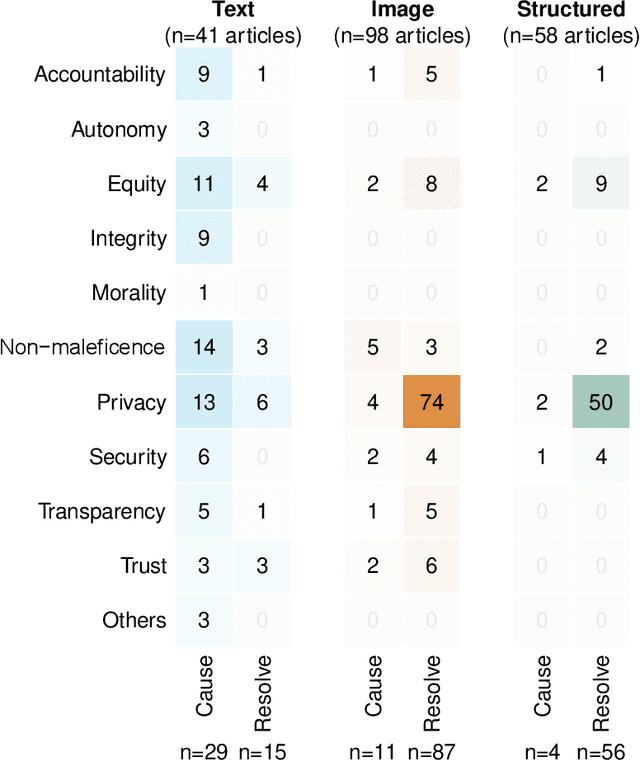
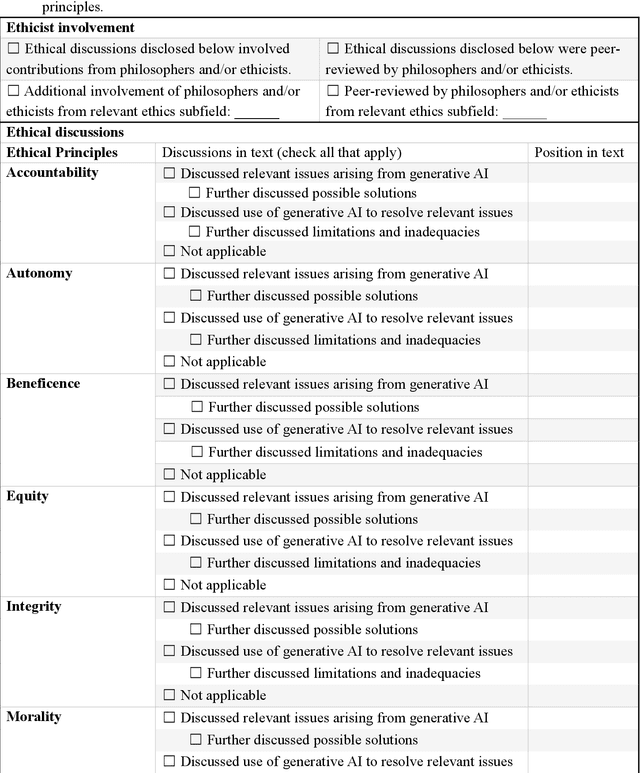
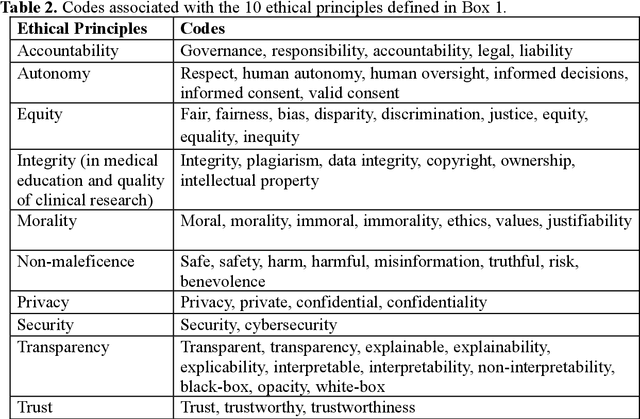
Abstract:The widespread use of ChatGPT and other emerging technology powered by generative artificial intelligence (AI) has drawn much attention to potential ethical issues, especially in high-stakes applications such as healthcare. However, less clear is how to resolve such issues beyond following guidelines and regulations that are still under discussion and development. On the other hand, other types of generative AI have been used to synthesize images and other types of data for research and practical purposes, which have resolved some ethical issues and exposed other ethical issues, but such technology is less often the focus of ongoing ethical discussions. Here we highlight gaps in current ethical discussions of generative AI via a systematic scoping review of relevant existing research in healthcare, and reduce the gaps by proposing an ethics checklist for comprehensive assessment and transparent documentation of ethical discussions in generative AI development. While the checklist can be readily integrated into the current peer review and publication system to enhance generative AI research, it may also be used in broader settings to disclose ethics-related considerations in generative AI-powered products (or real-life applications of such products) to help users establish reasonable trust in their capabilities.
Ethical Implementation of Artificial Intelligence to Select Embryos in In Vitro Fertilization
Apr 30, 2021
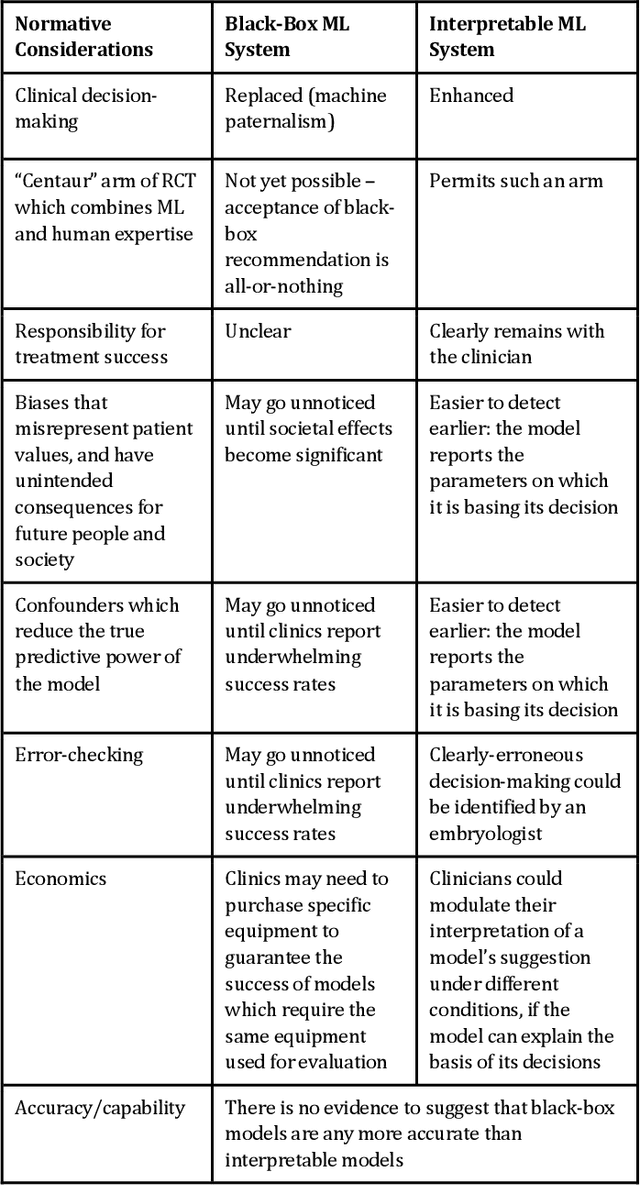
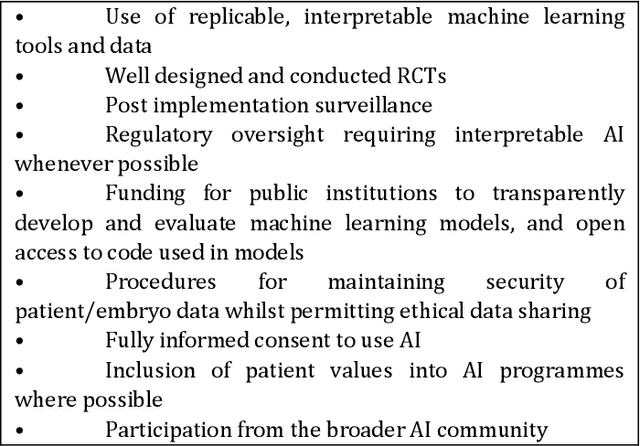
Abstract:AI has the potential to revolutionize many areas of healthcare. Radiology, dermatology, and ophthalmology are some of the areas most likely to be impacted in the near future, and they have received significant attention from the broader research community. But AI techniques are now also starting to be used in in vitro fertilization (IVF), in particular for selecting which embryos to transfer to the woman. The contribution of AI to IVF is potentially significant, but must be done carefully and transparently, as the ethical issues are significant, in part because this field involves creating new people. We first give a brief introduction to IVF and review the use of AI for embryo selection. We discuss concerns with the interpretation of the reported results from scientific and practical perspectives. We then consider the broader ethical issues involved. We discuss in detail the problems that result from the use of black-box methods in this context and advocate strongly for the use of interpretable models. Importantly, there have been no published trials of clinical effectiveness, a problem in both the AI and IVF communities, and we therefore argue that clinical implementation at this point would be premature. Finally, we discuss ways for the broader AI community to become involved to ensure scientifically sound and ethically responsible development of AI in IVF.
 Add to Chrome
Add to Chrome Add to Firefox
Add to Firefox Add to Edge
Add to Edge